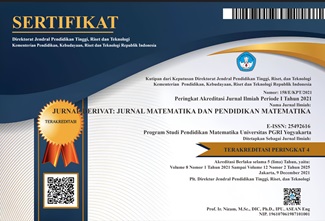Pendekatan Matematika Realistik Untuk Meningkatkan Kemampuan Berpikir Matematis Siswa
DOI:
https://doi.org/10.31316/j.derivat.v6i2.499Abstract
Abstract
The purpose of this study is to improve students' mathematical thinking skills using a realistic mathematical approach. The research is a Classroom Action Research (CAR) conducted collaboratively and participatively. The subject of the research was the students of class VIII B, State Junior High School 2 Giriwoyo, in the academic year 2017/2018 with 32 students. While the object of research is the whole process of learning mathematics through the application of a realistic mathematical approach implemented in class VIII B of SMP Negeri 2 Giriwoyo. Based on data obtained from observations, field notes, questionnaires, interviews, tests of cycle I and cycle II, as well as documentation, the researcher concludes that mathematics learning activities through the application of a realistic mathematical approach in class VIII B of SMP Negeri 2 Giriwoyo are carried out according to plans that have been prepared . In addition, the purpose of the action taken is to improve students' mathematical thinking abilities achieved.
Â
Keywords: Realistic Mathematics Approach, Mathematical Thinking Ability
Downloads
Published
Issue
Section
Citation Check
License
Authors who publish with this journal agree to the following terms:
-
Authors retain copyright and grant the journal right of first publication with the work simultaneously licensed under a Creative Commons Attribution-ShareAlike 4.0 International License that allows others to share the work with an acknowledgment of the work's authorship and initial publication in this journal.
- Authors are able to enter into separate, additional contractual arrangements for the non-exclusive distribution of the journal's published version of the work (e.g., post it to an institutional repository or publish it in a book), with an acknowledgment of its initial publication in this journal.
- Authors are permitted and encouraged to post their work online (e.g., in institutional repositories or on their website) prior to and during the submission process, as it can lead to productive exchanges, as well as earlier and greater citation of published work (See The Effect of Open Access).







